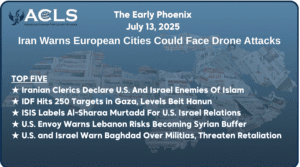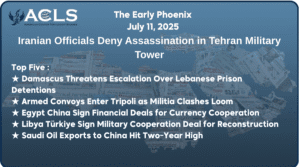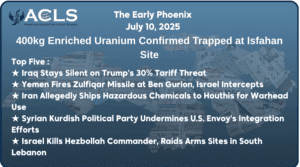TOP HEADLINES:
- IDF Chief Says Israel is Preparing for Offensive Against Hezbollah
- Biden Administration Says Gaza Cease Fire Could Avert Israel-Hezbollah Conflict
- Hamas Says Haniyeh Will Stay in Turkey Indefinitely
- PUK Rejects Delaying Iraqi Kurdistan Parliamentary Elections
- Turkey Says it Will Join South Africa’s Case Against Israel in The Hague
=======================
★ ISRAEL & PALESTINIAN TERRITORIES
IDF Chief Says Israel is Preparing for Offensive Against Hezbollah
Israeli Defense Forces Chief of Staff, Lt. Gen. Herzi Halevi, visited the Lebanon border and informed the troops that Israel is preparing for an offensive against Hezbollah. Israel has threatened military action to push Hezbollah away from the border and has conducted several strikes on Hezbollah positions in southern Lebanon. Meanwhile, Hezbollah has continued its attacks to support Gaza in the ongoing conflict. French Foreign Minister Stéphane Séjourné has been involved in diplomatic efforts to de-escalate the situation, proposing amendments to ensure the implementation of UN Resolution 1701, which requires Hezbollah to withdraw its forces.
Israel Says it Will Halt Payments to Palestinian Authority if ICC Issues Arrest Warrants for Israeli Leaders
Israel has warned the United States that it could undermine the Palestinian Authority if the International Criminal Court issues arrest warrants for its leaders. Axios reported that Israeli officials fear the Court might soon target Prime Minister Benjamin Netanyahu, Defense Minister Yoav Galant, and Chief of Staff Herzi Halevy. Should warrants be issued, Israel intends to hold the Palestinian Authority responsible and may retaliate by freezing the transfer of tax revenues to the Authority, a move that could lead to its financial collapse.
Colombian President Severs Diplomatic Relations with Israel
Colombian President Gustavo Petro announced the severance of diplomatic relations with Israel, citing the ongoing conflict in Gaza as the reason. He accused the Israeli government and its president of genocidal actions. In response, Israeli Foreign Minister Israel Katz criticized Petro, accusing him of supporting Hamas and negatively characterizing the historical relationship between Colombia and Israel. Katz asserted that Israel would continue to defend its citizens despite criticisms. The tension escalated following Petro’s earlier threats to cut ties if Israel did not comply with a UN resolution to halt fighting in Gaza. Additionally, Petro has previously made controversial comparisons between Israel and Nazis and criticized Israeli actions as genocidal.
Hamas Condemns Palestinian Authority for Shooting an Islamic Jihad Gunman in West Bank
Hamas criticized the Palestinian Authority (PA) for the killing of a Palestinian Islamic Jihad (PIJ) member in Tulkarm, West Bank. The PA’s security forces claimed they were attacked during a patrol and responded by shooting the gunman, who later died in the hospital. However, local groups described the incident as an unprovoked assassination, comparing it to Israeli military tactics. This event marks a rare instance of violence between Palestinian groups.
Hamas Says Haniyeh Will Stay in Turkey Indefinitely
Ismail Haniyeh, the head of Hamas’ political bureau, has extended his stay in Turkey indefinitely after arriving with a high-level delegation on April 19 and meeting with Turkish President Recep Tayyip Erdogan. This prolonged stay coincides with reports of Qatar distancing itself from Hamas and Turkey’s emerging role in mediating between Israel and Hamas. Turkey is seen as a potential new base for Hamas leadership, especially as Qatar reevaluates its involvement. Haniyeh’s decision to stay was influenced by Erdogan’s invitation and the strategic need to meet with officials who are less inclined to visit Qatar.
=======================
★ IRAN
Iran Imposes Sanctions on US and UK Entities Supporting Israeli Actions
Iran has announced sanctions against certain US and UK individuals and entities, accusing them of supporting Israeli actions against Palestinians. The sanctions target companies like Lockheed Martin and Chevron for aiding Israeli military activities, and individuals such as Jason Greenblatt and Grant Shapps for facilitating Israeli policies. The Iranian Foreign Ministry asserts these measures are in response to violations of Palestinian human rights and regional peace disruptions.
Tensions Rise in Iran as Parliament Speaker Battle Threatens Khamenei’s Influence
As Iran prepares for a run-off election to fill the last 32 parliamentary seats, a power struggle over the Speaker’s position looms, marking a crucial phase in the lead-up to the post-Khamenei era. Current Speaker Mohammad Bagher Ghalibaf, a relative of Supreme Leader Ali Khamenei, is competing against ultra-hardliner Hamid Rasaei and others. The internal Majles (parliament) elections are seen as pivotal for Khamenei, who could lose control if Rasaei, known for his disregard for Khamenei’s directives, secures the speakership.
Former Iranian President Rouhani Criticizes Reinstatement of Morality Police
Ex-President Hassan Rouhani has openly criticized the reactivation of Iran’s morality police and strict hijab enforcement. Addressing officials, Rouhani questioned the police’s training and approach to enforcing moral codes, highlighting the reported violent incidents involving law enforcement and women opposing mandatory hijab rules. He stressed the importance of dignity and voluntary compliance with hijab post-revolution, rather than force. 61 attorneys and female activists have condemned the government’s tactics and affirmed their opposition to the oppressive measures.
Iran Showcases Missile and Drone Arsenal
CNN was granted exclusive access to an Islamic Revolutionary Guard exhibit in Tehran, where Brigadier General Ali Belali showcased Iran’s ballistic missiles and drones used in a recent strike against Israel. This display followed a tense period with Iran responding to a suspected Israeli airstrike in Damascus. Iran’s show of military capability is seen as a demonstration of readiness for broader conflict, despite international concerns over its missile program. The exhibit also included a US drone, claimed to have been downed by Iran in 2011, underscoring advances in Iran’s defense technology.
Khamenei Criticizes Renewed Israel-Saudi Normalization Efforts
Iranian Supreme Leader Ayatollah Ali Khamenei has expressed opposition to the latest U.S.-led efforts to normalize relations between Israel and Saudi Arabia. Khamenei argued that forcing neighboring countries into normalization with Israel won’t solve regional problems. His remarks follow the Biden administration’s push for a peace deal that includes a security pact and civil nuclear aid for Saudi Arabia, conditional on Israel’s commitment to establishing a Palestinian state.
=======================
★ YEMEN
White House Confirms American Military Presence in Yemen
The White House acknowledged that a small contingent of American forces is in Yemen to assist with intelligence and targeting for airstrikes. This statement contradicts earlier comments from the Pentagon, which denied any American military presence in Yemen. The deployment, detailed in a White House letter to Congress, is part of operations against Al-Qaeda in the Arabian Peninsula and ISIS, aimed at diminishing the terrorist threat in collaboration with Yemeni and regional forces.
=======================
★ IRAQ
Islamic Resistance in Iraq Claims Drone Strikes on Israeli Targets
The Islamic Resistance in Iraq has declared responsibility for drone strikes on Eilat and the Golan Heights, citing retaliation for Israeli actions in Gaza. The group targeted what it called vital locations in both areas, aiming to support Palestinians and protest Israeli policies. These strikes are part of a broader pattern of attacks by Iraqi resistance factions against Israeli and American interests in the region and in opposition to U.S. military aid to Israel. The faction promises assaults on what it continues to refer to as enemy strongholds.
Iraqi PM Sudani Says Attacks on Iraq’s Economic Sites are Acts of Terrorism
Iraqi Prime Minister Muhammad Shiaa Al-Sudani has declared attacks on economic facilities, such as the recent drone strike on the Kormor gas field in Sulaymaniyah, as terrorist acts. During a visit to the Ministry of Interior, he urged security forces to respond decisively to such threats and reiterated his support for ongoing security operations. This directive allows for immediate action against threats to critical infrastructure without awaiting higher approval, emphasizing the government’s commitment to safeguarding economic stability and pursuing those responsible for disruptions.
Iraq Continues to Exceed OPEC Production Limits
Despite OPEC’s effort to curtail oil output, Iraq persists in exceeding its production targets, as detailed by a Bloomberg report. In April, OPEC countries collectively reduced output by 50,000 barrels per day, but gains in Iraqi and Libyan production countered cuts from Iran and Nigeria. This imbalance hinders the coalition’s strategy to prevent market surplus and stabilize oil prices, which hovered around $85 a barrel. While some members like Saudi Arabia adhere to their quotas, Iraq’s non-compliance, driven by economic recovery needs, remains a notable challenge as OPEC+ approaches a critical meeting on future production policies.
PUK Rejects Delaying Kurdistan Parliamentary Elections
The Patriotic Union of Kurdistan (PUK) has expressed strong opposition to any further postponements of the Kurdistan Region’s parliamentary elections, slated for June 10. The PUK statement comes in response to the Kurdistan Democratic Party’s (KDP) decision to boycott the elections over minority rights issues and other procedural directives from Baghdad. The PUK, currently part of the caretaker government, warned that additional delays could undermine the government’s legitimacy. They also threatened legal action to ensure the elections proceed as scheduled, despite the Independent High Electoral Commission halting preparations and the U.S. suggesting a possible short delay for party negotiations.
=======================
★ SYRIA
UN Receives Complaint Against Russia for 2019 Hospital Bombing in Syria
A new complaint filed with the UN Human Rights Committee accuses Russia of a 2019 attack on a hospital in Idlib, Syria, that resulted in civilian casualties. Submitted by a victim’s relative and the relief agency Hand in Hand for Relief and Development, the complaint presents evidence including video clips and witness testimonies. It asserts that Russia, supporting Syrian forces since 2015 and accused of war crimes, violated international law. Russia, denying these accusations, is under scrutiny as the UN committee evaluates the case.
Riyad Hijab Accuses US of Pushing for Assad Normalization to Lift Sanctions
Riyad Hijab, a former Syrian Prime Minister and regime dissident, criticized the current U.S. administration for promoting normalization with Bashar al-Assad’s regime and for efforts to lift sanctions against it, claiming these actions contradict international humanitarian law and U.S. ethical standards. Hijab highlighted the concerning trend of the international community’s tacit acceptance of leaders who commit atrocities.
=======================
★ LEBANON
EU Pledges €1 Billion to Bolster Lebanon’s Stability
European leaders converged in Beirut to tackle pressing issues, notably the Syrian refugee crisis. Cyprus President Nikos Christodoulides and EU Commission President Ursula von der Leyen met Lebanese officials, including Prime Minister Najib Mikati. Discussions centered on the Syrian refugee situation and bolstering cooperation. Mikati urged EU intervention to quell Israeli aggression and address Lebanon’s refugee burden. Von der Leyen pledged a €1 billion aid package to foster economic and social stability, emphasizing collaborative efforts to combat refugee smuggling from Lebanese shores.
Israel and Lebanon to Enter Indirect Talks in Paris
Israel has consented to participate in indirect negotiations with Lebanon in Paris, facilitated by France, to address ongoing border conflicts. The discussions aim to mediate the hostilities with Hezbollah and assist in the repatriation of displaced individuals. The French government is committed to supporting these talks, which also include discussions on border adjustments and a Hezbollah pullback as measures to avert potential conflict.
Biden Administration Says Gaza Cease Fire Could Avert Israel-Hezbollah Conflict
President Joe Biden’s administration is actively working towards a ceasefire and hostage exchange between Israel and Hamas. Administration officials believe this initiative could potentially de-escalate tensions and prevent conflict between Israel and Hezbollah along the Israel-Lebanon border. A proposed 40-day ceasefire includes a swap of hostages for Palestinian prisoners, with Hamas expected to respond shortly. Israel awaits confirmation before proceeding with negotiations in Cairo.
=======================
★ JORDAN
Jordan Condemns Attack on Aid Convoys to Gaza
Jordan’s foreign ministry condemned an attack by extremist Israeli settlers on two Jordanian aid convoys carrying humanitarian aid to the Gaza Strip. The Ministry accused the Israeli government of violating its legal obligations by failing to protect the two aid convoys. The Ministry’s spokesman, Ambassador Dr. Sufyan Al-Qudah, said that the two convoys continued their mission, despite the attack, out of concern to deliver aid to Gaza in light of the humanitarian catastrophe it is facing, and they reached their destinations.
=======================
★ GULF REGION
Congress Skeptical of U.S.-Saudi Deal Without Israeli Normalization
U.S. Congressional leaders express doubts about approving a U.S.-Saudi defense treaty if it does not include normalization of relations between the Kingdom and Israel. Despite Saudi Arabia’s keen interest in normalizing relations with Israel, resistance from Israeli leadership to a Palestinian state remains a significant barrier. U.S. lawmakers, particularly from the Senate, stress that any defense pact must also ensure safeguards for Israel’s future.
Saudi Arabia Proposes U.S.-Saudi Defense Agreement Excluding Israel
Saudi Arabia is pushing for a revised “Plan B” agreement with the U.S. that sidesteps Israel, due to the absence of a Gaza ceasefire and Israeli resistance to a Palestinian state. The proposed bilateral deal includes a defense pact, support for Saudi’s civil nuclear program, and advanced technology sharing, independent of Israeli involvement. While aiming for normalization with Israel in exchange for progress toward a two-state solution, the Saudis are moving forward with U.S. negotiations focused on strategic alliances against global powers like China and Russia, despite potential Congressional resistance.
Foreign Banks Shift to Riyadh as Saudi Law Requires Local Headquarters
Under a new Saudi law mandated by Crown Prince Mohammed Bin Salman, foreign banks are relocating their regional headquarters to Riyadh, moving away from traditional hubs like Dubai. This shift is part of Saudi Arabia’s broader strategy to transform its capital into a major financial center, leveraging vast oil wealth to attract global businesses. While the move offers access to lucrative contracts, it also presents challenges due to Riyadh’s conservative social environment. Deutsche Bank AG, for example, has increased its staff in Riyadh, emphasizing the city’s growing significance in the financial sector.
=======================
★ EGYPT AND NORTH AFRICA
Egypt’s Intelligence Chief Holds Talks with Hamas Leader as Cairo Says Truce Negotiations Show Positive Momentum
Egypt’s Minister of General Intelligence, Abbas Kamel, initiated a call with Hamas’s political bureau chief, Ismail Haniyeh, sources confirm. A Hamas delegation is slated to arrive in Cairo within 48 hours for ceasefire negotiations, signaling escalated diplomatic efforts. Meanwhile, a senior Egyptian official confirms progress in Gaza truce talks as Israeli officials prepare for Cairo discussions on a potential exchange deal. Cairo anticipates announcing a humanitarian ceasefire within 48 hours, paving the way for substantive negotiations, including detainee exchanges.
Egypt’s Banks Witness Significant Improvement in Foreign Asset Deficit
Egypt’s commercial banks have significantly reduced their net foreign asset deficit by about 78% to $2.8 billion as of last month, the lowest since March 2022. This reduction from $13.2 billion in February follows the “Ras El Hekma” deal, a financial arrangement providing $24 billion, part of which converted $11 billion in dollar deposits to local currency. The Central Bank’s own foreign assets deficit similarly decreased by about 84% to $1.38 billion. This financial recovery has been bolstered by a series of international loans and funding agreements, including a notable $8 billion from the IMF.
=======================
★ TURKIYE
Iraqi Sources: $1.5B Judgment Against Ankara is Blocking Restart of Kurdistan Oil Exports
The restart of Kurdistan Regional Government (KRG) oil exports via Turkey faces hurdles as Ankara rejects the $1.5 billion compensation ordered by an international court. Concurrently, the KRG insists Iraq’s central government cover the operational costs of regional oil companies. Efforts to find alternative export solutions are underway, with recent discussions between regional leaders and international delegates, including a meeting in Erbil with Iranian officials, focusing on broader political and economic issues in Kurdistan.
Turkish Foreign Minister Says Hamas Leaders Won’t Relocate to Turkey
Turkish Foreign Minister Hakan Fidan denied speculation about the relocation of Hamas leaders to Turkey, stressing that the matter is not under consideration. Fidan emphasized the development of Hamas into a political entity after the establishment of the Palestinian state, and called for taking a decisive position on the two-state solution. Fidan described Saudi-Turkish relations as positive, and pointed to cooperation to ease tensions between Iran and Israel while avoiding escalation of the conflict.
Turkey Deports Thousands of Syrians
In April, Turkey reportedly deported about 16,000 Syrians who violated residency requirements and suspended the issuance of exceptional nationalities while tightening conditions for residency renewals. These actions include forced signings of “voluntary return” forms and deportations to northern Syria, a region under Turkey’s influence. Human Rights Watch and the Syrian Observatory for Human Rights criticized these actions as inhumane and contrary to international refugee rights agreements. Turkish authorities insist these expulsions are not forced, despite allegations from activists. The deportations target those violating residency or temporary protection conditions.
Turkey Will Join South Africa’s Case Against Israel in The Hague
Turkey has decided to join South Africa in a lawsuit against Israel at the International Court of Justice, as announced by Turkish Foreign Minister Hakan Fidan. This decision follows allegations of genocide against Palestinians in Gaza, attributed to Israeli bombings which have caused displacement and hunger. The International Court of Justice has previously ordered Israel to ensure its forces do not commit acts considered genocidal. This legal move is part of Turkey’s broader support for Palestine, despite Israel and its Western allies dismissing the accusations as baseless.
=======================
📌 Incase you missed it,
📰 THE EARLY PHOENIX May 1, 2024
📰 THE EARLY PHOENIX April 30 , 2024
📰 THE EARLY PHOENIX April 29 , 2024
=======================
🔗 Follow the latest news from the American Center for Levant Studies via Google News



